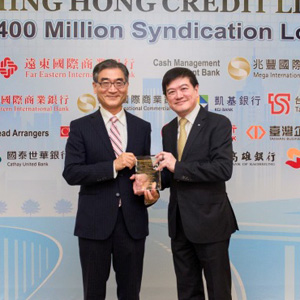04.2019 Cover Story
Accelerating the global layout, Far Eastern New Century Corporation re-upgrades Production and Marketing Structure
Far Eastern Magazine / Editorial Room
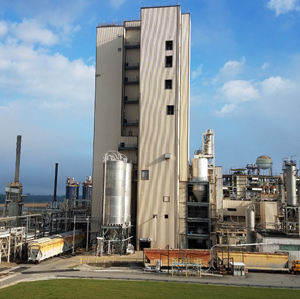
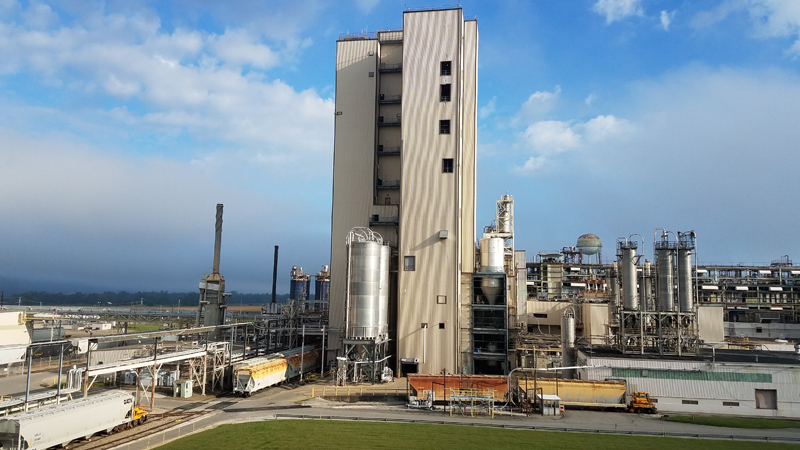
Far Eastern New Century Corporation, which is approaching its 70th anniversary this year, is the first enterprise of Far Eastern Group and the earliest spinning manufacturer in Taiwan to complete vertical integration of upstream, middle and downstream. One-stop production and marketing structure chain is its biggest competitive advantage. In order to fully grasp the niche, Far Eastern Group has established a complete polyester industry chain on both sides of the Taiwan Strait. In recent years, it has also built a third vertical integration base in Vietnam, actively expanding important bases such as the United States and Japan, and striving for global business opportunities.
I. Polyester Granules - Advance America and Vietnam to become the world's three largest suppliers of PET
As early as 20 years ago, Far Eastern New Century Corporation advanced to the mainland. Three ester granule production bases, Xinpu, Guanyin and Shanghai, were set up on both sides of the mainland. In recent years, in addition to process renovation for Guanyin Factory, it has gradually optimized and upgraded production equipment in China, reduced carbon emissions and energy use in the process, and continued to develop new products.
Due to the rapid expansion of China's red supply chain since 2000, the upstream and downstream industrial chain of PET has been severely impacted, including the Asian, Western, Indian Ocean and European markets. Only the American and Eastern markets have remained stable and profitable. Far Eastern New Century Corporation extended its antenna to the American and Eastern markets in 2018 and merged with APG plant in West Virginia. It successfully resumed production in the third quarter with an annual output of 36. Ten thousand tons of PET. Located in the most populous and demanding market in the United States, the factory is more competitive than its counterparts in terms of raw materials, energy and transportation costs. Therefore, 90% of its production capacity is mainly sold in the United States, supplying well-known beverage brands such as Coca Cola, Pepsi Cola and key Converter in the Americas. In addition to general PET products, the factory has also obtained the best quality Barrier PET patents, which can be extended to new uses such as beer, food packaging and so on. In the future, green products will be further planned to meet the market's expectations for green packaging and recycled economy. At the same time, Far Eastern Group has also established RD Center in the United States as a pioneer in the continuous development of the PET market.
Moreover, Far Eastern Group's newly invested Texas CCP plant will be restarted this year, which is the largest PTA+PET consistency project in the world and the largest PTA investment project in the United States. Due to the excellent geographical location of the Gulf of Mexico, it enjoys sufficient supply of raw materials and convenient land and water transportation. It is expected that after its commissioning in 2020, it will increase its capacity by 367,000 tons, accelerating the expansion of the market share in North America.
In addition to the United States, Vietnam, a member of the Association of Southeast Asian Nations (ASEAN) of RCEP, has also signed the CPTPP (Trans-Pacific Partnership Agreement) led by Japan. Besides Singapore, Vietnam has signed the most FTA (Free Trade Agreement) countries in Southeast Asia, which is the lowest tariff barrier to export of products in the south-ward policy, Far Eastern New Century Corp. Of course, Oration will not give up the battlefield. In the fourth quarter of last year, Far Eastern Group Chemical Fiber Vietnam Factory successfully put into operation, with an annual output of 400,000 tons of PET, and has successively obtained international brand certification. At the present stage, the export markets in Europe and the United States will be the main force, and in the next stage, the ASEAN local market and the Japanese market will be actively exploited.
After the new production capacity of APG plant in America and Vietnam Chemical Fiber Plant was put into operation, the production capacity of Far Eastern Group's new bottle polyester granules has exceeded 2 million tons, which has formally leaped to the third largest supplier of bottle polyester in the world.
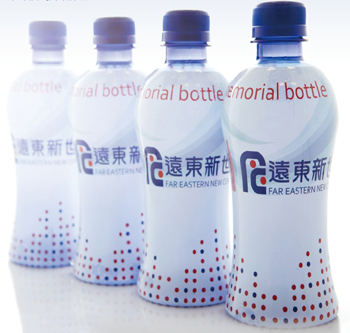
2. Bottle Embryo, Film and Polyester Membrane: Targeting New Business Opportunities in Asia
1. Bottle embryo:Far Eastern New Century Corporation has been deeply engaged in the carbonated beverage packaging market in Taiwan, Hong Kong and Japan for many years. It has nearly 90% of the market in Taiwan and Hong Kong. In recent years, its sales have increased steadily thanks to the hot sales of bubble water. In Japan, it has maintained good interaction with small and medium-sized beverage brand customers. According to the statistics of imports of bottle embryos shipped from Taiwan to Japan, the proportion of Far Eastern Group has reached 60%. 。 At present, Xinpu Bottle Factory, located in Taiwan, has an annual capacity of 1.2 billion bottle embryos. With the addition of a new ejector this year, the overall capacity will be increased to 1.4 billion bottles. In the future, Far Eastern New Century Corporation will not only focus on developing oxygen-absorbing embryos and improving the quality and duration of oxygen-sensitive products to enhance product differentiation, but also continue to promote green products. It will provide 25%-100% RPET added embryos for two major brands of customers in Hong Kong. Meanwhile, it will also aim at the expansion of Japanese brands in other Asian markets and provide a supply scheme of bottle embryo packaging materials.
In order to serve the ASEAN market such as Singma, Far Eastern New Century Corporation also established a Far Eastern Group Bottle Manufacturing (Malaysia) factory in Malaysia, with an annual output of 1.4 billion bottle embryos, and set up three in-house bottle blowing plants in the local area to supply empty bottles to customers'factories nearby, in order to save freight costs and carbon emissions. In the future, we plan to promote Recycle PET (RPET) +Virgin PET beverage bottles with world-renowned beverage brands and Star Horse's largest beverage companies in order to fulfill corporate social responsibility and raise the competitive threshold.
2. Film:After the completion of the expansion of the new line in Shanghai in 2019, the annual production capacity of polyester film (A-PET) has exceeded 130,000 tons, which continues to rank the top of the Asian industry. It is jointly developed and shipped with the integrated material number of Xinpu Chemical Fiber, Guanyin and other cross-strait factories located in Taiwan.
At present, the main cooperative brands include Hasbro, the leading toy industry, Qunchuang, the panel supplier, Kingston, the memory manufacturer, etc. In the future, we will continue to promote green products and differentiated products, such as replacing general food packaging with oxygen-absorbing materials. We expect to try to replace the sausage box packaging of unified products first, and then focus on the packaging of foreign food factories. In addition, we will work with Colgate, IKEA, PG and other international brands to jointly develop and test green materials or special material packaging boxes. For the Japan area where A-PET is mainly used and the ASEAN area with strong development power, Far Eastern Group will also play its advantages in capacity dispatching and diversified product selection to create operational success.
3. Polyester membranes:Far Eastern Group has several polyester film production lines, including Coca-Cola and Fujiseal. It is worth mentioning that Far Eastern Group has recently replaced shrinkable PVC membranes with environmentally friendly membranes to reduce pollution emissions of PVC wastes. It has been certified by major domestic and foreign brand manufacturers and printing plants. With the European and American market as the main force, the next stage will plan new production lines to jump to the first place in the world, and actively exploit the East with the advantages of market characteristics and trade tariffs. Concorde with the Southern Hemisphere Market. On the other hand, we will continue to develop high-value new products such as shrinkage film and low-density white film for recycling bottles to meet the needs of environmental protection.
3. Recycled Polyester Pellets (RPET) - Deep Tillage Day's R&D technology is globally proud

Far Eastern New Century Corporation is committed to the development of green products. In addition to publishing 100% plant-extracted bio-materials and producing bio-polyester bottles (100% Plant Bottle made by Bio PET Resin) at the World Expo in Milan in 2015, Far Eastern New Century Corporation has also invested in the Bottle-to-Bottle recycling industry chain to make waste Bottle bottles as raw materials. Regenerated polyester pellets (RPET), especially food-grade regenerated polyester pellets, are more complex and must conform to the safety specifications of FDA, EFSA and Japan.
Far Eastern Group's new production base for polyester pellets for recycled bottles is located in Taiwan and Japan, ranking second in the world in total capacity, with customers including Coca-Cola, Pepsi Cola, IKEA and other brands. Oriental Resources Development Co., Ltd. of Taiwan, aiming at the business opportunities of Tokyo Olympic Games in 2020, takes advantage of Xinpu Chemical Fiber Plant to inject process advantages directly and expand the recovery of output value and profits. The Tokyo plant of Far Eastern Group Green PET Co., Ltd. in Japan handles 50,000 tons of bottle bricks (discarded Bottle Compressed Products) annually. The production of RPET ester grains reaches 35,000 tons. With the supply of Virgin PET from Taiwan and Vietnam, the total PET supply is expected to reach 300,000 tons in 2019, accounting for nearly 40% of Japanese bottle grade ester grains. It is the largest supplier of PET in Japan.
In recent years, with the rising awareness of global environmental protection, the market has been booming in both quantity and price, especially the major Japanese beverage manufacturers have announced that the use rate of RPET will be increased by 50% by 2030, when the market demand will be 5-6 times the total production capacity of the current market. Far Eastern Group gravel Green PET is also accelerating the pace of expansion in the face of rapid growth of the market. By the third quarter of next year, it will complete the expansion of the second plant with higher automation, so as to increase the overall capacity to 85,000 tons, and complete the site selection of Guanxi Plant (the third plant) this year. In the future, cooperation or joint venture with customers will not be excluded to accelerate the expansion of the new plant. At the same time, in order to integrate the sales and logistics of PET products and RPET production capacity, a Japanese sales branch is expected to be established next year to enhance profitability.
In addition, Far Eastern New Century Corporation has also applied for a recycling plant in Vietnam to build a global recycling chain and complete the Close Loop for PET recycling. It is expected to start production in 2021. At the same time, it has been invited by Indonesian beverage factories to go to In-House to produce Bottle-to-Bottle products, and continues to seek suitable production sites in the United States to expand the United States. National PET niche.
IV. Fiber-Flag-inserting Philippines and Vietnam Actively Attacking Environmental Protection Finance
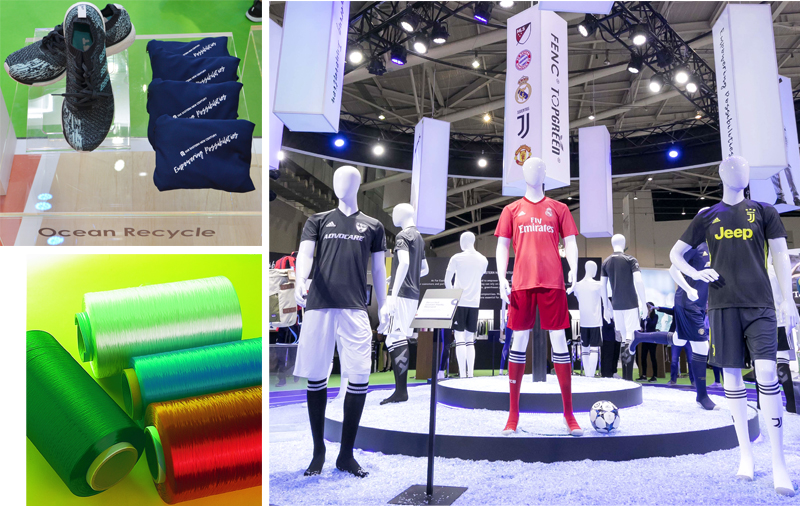
The staple fibers of Far Eastern New Century Corporation have their own production bases on both sides of the Taiwan Strait. Among them, the main products of Taiwan's Xinpu Chemical Fiber Factory are low melting point cotton and sanitary cotton, while the distant textile industry (Shanghai) has filled cotton production lines in addition to the above products. In the future, it will continue to upgrade its hardware and develop towards automation and intellectualization in order to enhance its productivity and profit. Utilization rate, and the development of a new generation of products with market potential, so that product mix more diversification and specialization.
In order to overcome the obstacles of global trade, staple fibers group also chose Vietnam as the third production base and imported the existing intelligent production software and hardware of Xinpu factory. The first phase of expansion aimed at 100,000 tons per year, hoping to sell filling cotton and sanitary cotton to European and American household textile and industrial customers.
Long Fiber Group has made great efforts to lay out green environmental protection products on both sides of the Straits. Among them, Bottle Recycled Fiber has been highly praised for its cooperation with several well-known international brands. In particular, the "Ocean Recycled Yarn Project", which was solely cooperated with Adidas and Parley, a non-governmental organization, in the past two years, has won great praise. In 2017, it produced 1 million pairs of ocean reclaimed yarn sneakers, and in 2018 it is expected to leap to 5 million pairs This year will push up to 11 million pairs. In addition, in recent years, it has actively developed raw color yarn and other materials to reduce energy and water consumption.
Moreover, considering that there are up to 40 million tons of garment waste in the world every year, most of the textiles used are either sent to incinerators or landfills, which impose a heavy burden on the environment, Far Eastern New Century Corporation is the first solution to recycle and reproduce waste textiles in the world - FENC.?TopGreen?RTex, through chemical recycling process, recycled PET monomer raw materials, make waste textiles into brand-new clothing again, which is expected to be the next city to develop recycled economy.
At present, RPET mainly uses Bottle to Fiber. Far Eastern Group's new Recycle fabric has become the designated fabric for World Cup football matches under the impetus of downstream knitting department. With the investment of global brand companies in environmental protection products, the demand is increasing year by year. Therefore, some regenerated polyester granule production lines in Taiwan are expected to start in January 2020; the Philippine regenerated polyester production line and Vietnam's POY/FDY (full extension), DTY (processing silk), and regenerated polyester production line are also planned to be put into production in 2020, and will be further planned in Europe and the United States in the future. New production bases will be built in the district. The downstream spinning sector, Vietnam's new production line is expected to start production in early 2021. At present, the processing equipment on both sides of the Taiwan Strait has been fully opened, and still can not meet the demand. Therefore, in addition to coordinating the cooperation between the same industry, consideration is also given to increasing the new production equipment in Shanghai and Vietnam, which will be put into operation at the beginning of 2020. It is worth mentioning that these production lines are leading the industry, importing a number of intelligent equipment and processes, not only to build intelligent production quality prediction system, planning cloud platform and Big Data system, but also to build intelligent power management system to achieve industrial 4.0 production mode. In the future, we will actively promote the integrated marketing of apparel value chain, and link with Nike, Adidas, The North Face, Columbia, Gap, HM and Victoria's Secret and other international well-known brands to obtain direct feedback from brand customers.
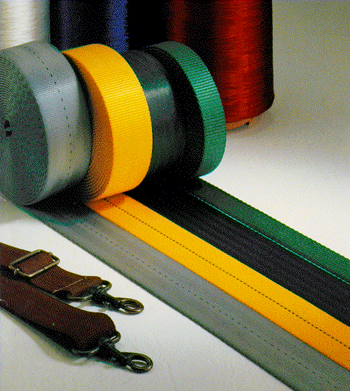
5. Industrial Textiles - Integrating the Application and Development of Focused Vehicle Materials across the Straits
Far Eastern Group's new industrial fiber business group mainly produces HTY (High Tenacity Yarn), Mechanical Rubber Goods (MRG) and ATG (Automobile Tire Goods). It has three production bases on both sides of the Taiwan Strait (Xinpu, Neiwei and Suzhou). The division of labor in the market is both integrated and competitive. It is also a small number of products from polyester polymerization solid phase polymerization spinning twisting/weaving/dipping. One of the integrated production plants.
Owing to the complete industrial silk raw materials of polyester and nylon 66, the industrial fibers group locked in the automotive fibre industry many years ago. HTY is the main cooperative manufacturer of Autoliv, Takata and TRW, which are the top three suppliers of automotive materials in the world, with the main products of automotive seat belts and airbag yarns. In recent years, with the development of green automobiles, ATG signed the Joint Development Agreement (JDA) with Continental, Sumitomo and other tire companies to develop light, low noise and energy-saving tire skeleton materials, and applied aramid blended fabric to aircraft tires. As far as MRG is mainly used for conveyor belts, besides the flourishing logistics belts in recent years, aramid belts replacing steel ropes, and high temperature belts used in steelmaking and cement plants, Far Eastern Group is also a small number of factories with 3D cloth machines. Its products are used for high-end applications such as surfboards, military rubber boats and aircraft.
Far Eastern Group is committed not only to the development of special materials, but also to building the first set of automated production lines from spinning to ATG with the help of Ding & Ding Management Consultants, Yuan Ze University and Oriental Institute of Technology from Italian and German manufacturers and groups. With its strong R&D capability, Far Eastern Group is leading the industry in exploring bio-PET. The application of Nylon 5, 6) and recycled materials has continuously enhanced their competitiveness.
In order to coordinate with the global distribution of key customers and diversify supply risks, the Industrial Fiber Group also plans to build a consistent manufacturing plant (CP-SSP-HTY-MRG/ATG) for upstream and downstream integration in Southeast Asia in the next three to five years, deepening the service of existing customers, and thus developing more new customers.
6. Far Eastern Dyeing & Finishing (Suzhou), Garment Manufacturing - Connecting Taiwan, China and Vietnam to Build Intelligent Manufacturing Supply Chain
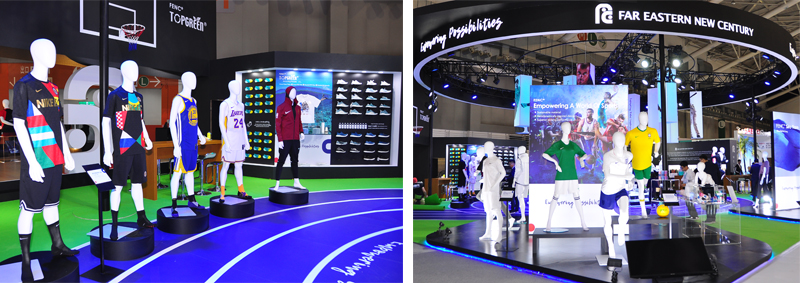
Taking Far Eastern Dyeing & Finishing (Suzhou) as an example, the main customers include Nike, Adidas, Gap and other world-class sports and leisure brands. At present, there are three production bases in Taiwan, Suzhou and Vietnam. In recent years, the main investment and expansion are concentrated in Vietnam. Far Eastern Polytex (Vietnam), which completed the first phase of its construction last year, is also manufactured in accordance with industrial 4.0 standards. In addition to automated production equipment, low energy consumption equipment is particularly selected. At the same time, strengthening automated production data acquisition will not only help the follow-up promotion of Big Data and AI, but also meet the environmental needs. It is the leading work in Asia. The factory is currently carrying out a phase of production line expansion, and is expected to put into operation in the second quarter of this year. As land has been acquired for the second phase of the plant construction project, the construction schedule will be planned according to the actual growth needs of the market and brand in the future.
On the other hand, 80% of the production capacity of the garment industry group is also concentrated in Vietnam. Starting this year, two garment factories, Far Eastern Group New Clothing (Vietnam) and Far Eastern Apparel (Vietnam), will be expanded in segments. It is expected that in three years'time, garment production capacity will double. In the future, in addition to continuing to deepen the vertical integration of high-value customers such as Lululemon and consolidate the position of core suppliers, we will also expand cooperation with world-class sports and leisure brands such as Nike, Polo Ralph Lauren and Calvin Klein to create higher profits.
Far Eastern Dyeing & Finishing (Suzhou) and garment manufacturing strongholds in China and Taiwan will continue to promote process automation and product differentiation. Taking Far Eastern Apparel (Suzhou) as an example, in 2018, it was selected as the strategic supplier of Nike's second wave automation (only three companies in the first wave and only four companies in the second wave). This shows that the garment manufacturing process, automation equipment and talents of the factory are in place, and it can be regarded as the main base of garment automation. However, due to the change of urban planning, the production line will be transferred to Linhu New Plant, which is expected to be completed in the fourth quarter of next year. By then, the new plant will have the same automated production process as each new plant, and will also meet China's green energy indicators and internationally certified LEED green energy indicators.
From polyester, chemical fibre, spinning, Far Eastern Dyeing & Finishing (Suzhou) to ready-made clothes, from production to customers, from Asia to the world, Far Eastern New Century Corporation takes vertical integration as its strategy and smart manufacturing as its sharp weapon. In a wave of global changes and challenges, it continues to build up its business strength and promote new momentum of growth.



